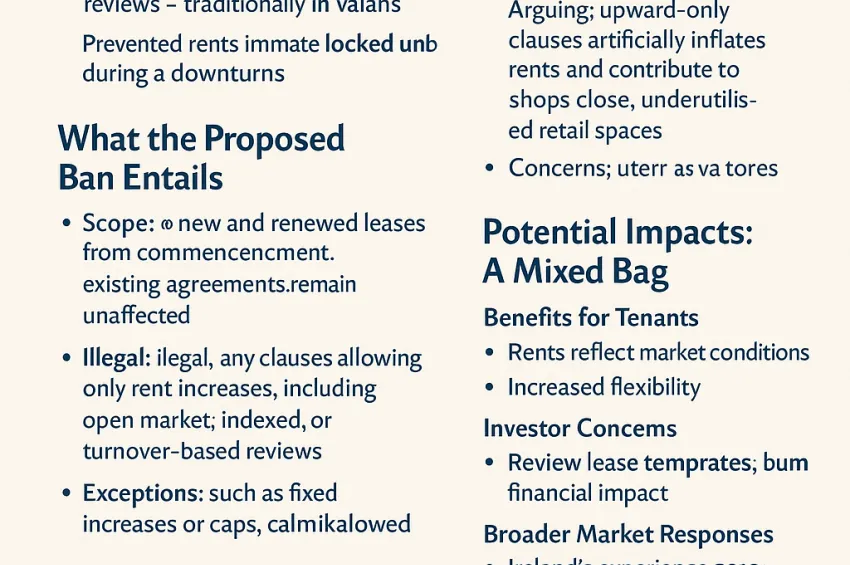
A seemingly unrelated devolution Bill has stirred a quiet yet seismic shift in UK commercial leasing. The English Devolution and Community Empowerment Bill, introduced in July 2025, contains a discreet but potentially transformative provision: a ban on ‘upward-only’ rent review clauses in new and renewed commercial leases.
What Are ‘Upward-Only’ Rent Reviews?
Traditionally, commercial leases in England and Wales have included upward-only rent review clauses—those that allow rent to rise to market levels but never decrease, even in a downturn. This practice has long offered landlords steady income and reassured investors and lenders. However, it has also locked tenants into inflated rents during economic slowdowns .
What the Proposed Ban Entails
-
Applies to new and renewed commercial leases governed by Part II of the Landlord and Tenant Act 1954—from the legislation’s commencement date. Existing agreements remain unaffected .
-
Illegalizes clauses that allow rent increases without the possibility of decreases, including open market, indexed, or turnover-based reviews. Instead, rent reviews must allow movement both up and down .
-
Exceptions permitted, such as fixed or stepped increases predetermined in the lease. Caps may be allowed, but collar-only (minimum uplift) clauses are prohibited unless paired with caps. Anti-avoidance measures prevent contractual workarounds, including side deals and put options .
-
Tenants granted new rights—even if the lease reserves review initiation to the landlord, tenants can now trigger rent reviews themselves to prevent landlords avoiding reductions .
Why the Government Is Making This Move
The aim is to revive high streets and support small businesses. The government argues that upward-only reviews inflate rents, making it harder for independent retailers to survive, contributing to shop closures and vacant, underutilized retail areas .
However, there are concerns this approach will deter investors. The British Property Federation and major players like British Land warn that the unexpected intervention, introduced without consultation, may undermine investor confidence—especially in sectors like offices and data centers that rely on stable cash flow forecasts .
Potential Impacts: A Mixed Bag
Benefits for Tenants
-
Rent reflects market conditions—no longer overpaying in downturns.
-
Increased flexibility and potential for fairer agreements.
Investor Concerns
-
Predictable income streams disrupted—could impact property valuations, financing, and landlord risk modeling .
-
Lease terms may become shorter, or landlords might increase initial rents to hedge against rent fluctuability .
Broader Market Responses
-
Ireland’s experience with a similar ban in 2010 shows markets adapt—through shorter leases, cap-and-collar arrangements, or more nuanced index-linked mechanisms .
-
Landlords may pivot to stepped rents, fixed rent increments, or rent tied to turnover—balancing predictability with fairness .
What Should You Do Now?
| If You’re… | Consider… |
|---|---|
| Tenant-new lease pending | Negotiate rent review clauses now—introduce downward options or fixed increases as part of heads of terms. |
| Landlord or investor | Review lease templates, model rental income scenarios in downturns, and consider alternative lease structures. |
| Broker or adviser | Keep an eye on Bill progress; second reading expected in September 2025. Adapt advice as the law evolves. |
Final Thoughts
This proposal marks a major shift in commercial leasing—realigning power and protection more in favour of tenants, especially smaller businesses. While still in its early legislative stages, the trajectory is clear: the UK is moving toward more flexible, fairer rent review mechanisms.
If you’re navigating lease negotiations or property investment in this changing landscape, Sahin Legal Consultancy can help you understand the implications and craft the right strategy as these reforms unfold.














